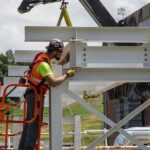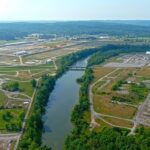
Note: This story was updated at 11:45 a.m.
On Monday, the Y-12 National Security Complex began limited operations and transitioning to mission-critical operations. The change is in response to the COVID-19 pandemic. For now, all non-essential personnel will leave the 811-acre nuclear weapons production plant in Oak Ridge, and employees who can telework will continue to do so.
“Since mid-March, Y-12 has been in a preventive phase of its pandemic plan,” the site in a a response to questions on Wednesday. The response was provided by spokesperson Kathryn King of Consolidated Nuclear Security, a federal contractor that manages and operates Y-12 and another nuclear weapons production plant, the Pantex Plant northeast of Amarillo, Texas.
“With additional cases now confirmed at Y-12 and the growing number of cases in East Tennessee, the plant is transitioning to a ‘containment’ phase that ensures mission-critical operations while further protecting the Y-12 workforce and the community,” the response said. “In the containment phases, all non-essential plant personnel will leave the site until further notice. Employees who are able to telework will continue to do so.”
CNS said all Y-12 processes, systems, and facilities will be maintained in safe and secure configurations. Key mission activities related to stockpile stewardship and modernization, and key infrastructure and reestablishment of production capabilities, will continue.
The construction of the Uranium Processing Facility will continue, CNS said. UPF is the largest federal construction project in Tennessee since World War II, and it is expected to be complete by 2025 at a cost of no more than $6.5 billion. It will replace an early-Cold War plant at Y-12.
CNS said it does not have a set timetable for the new containment status at Y-12.
“For planning purposes, the containment phase is planned for six weeks, but we all recognize that the timing and course of the pandemic remains undefined,” the contractor said. “The transition process to safe and stable condition will take approximately two weeks, and we anticipate at least two weeks in that condition. Once the decision to resume full operations is made, the transition back to the state of readiness will take another two weeks.”
CNS said there has been a concerted effort this fiscal year that has put Y-12 production ahead of required needs in a number of key areas.
“Anticipating a mission-critical operating condition for six weeks, it is expected that there will be no mission impact this fiscal year,” CNS said.
“We are reducing the on-site staffing level to the minimum required to maintain mission-critical operations while continuing to perform required checks, inspections, surveillances, and mission essential activities,” the contractor said. “Reducing staff on site will help reduce the risk of further spread of COVID-19, and we will continue to protect our workforce while securing the site and maintaining mission capabilities.”
CNS has 5,500 employees at Y-12. There are roughly 800 UPF employees at Y-12.
Among other activities, Y-12 works on secondaries, the second stage of modern two-stage thermonuclear weapons; stores highly enriched uranium; provides fuel for naval nuclear reactors; and supports nuclear nonproliferation work.
See previous story here.





Leave a Reply